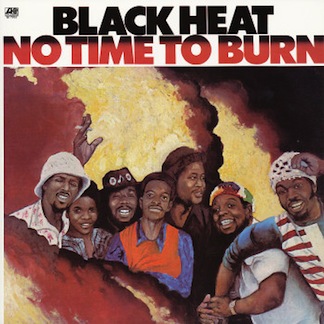Breakbeat Tuesday – No Time To Burn
So this Breakbeat Tuesday thing has really taken off and I’m pleased to announce that the column is soon going to be syndicated on a bunch of other sites. Also, be on the lookout for several guest entries for BBT starting very soon with some of your favorite DJs, producers, artists and just all around “folk.” But let’s get started with this week’s entry.
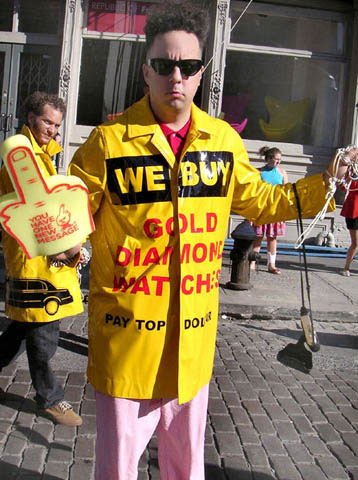 Now I’ve mentioned this before but my man ESPO aka Steve Powers was really instrumental on putting me on to a lot of records back in the day. I would lamp over his house in West Philly and he basically sat me down in front of the turntable and would be like “Okay, now you LISTEN to this Funkadelic record and LEARN IT.” So I am forever beholden to this dude for putting my head on at the right place and right time. For the few people out there who don’t know who dude is , get your shit together. And while you’re at it, stop messing around and buy his book. So anyway, this is a record that he put me up on, from Black Heat’s “No Time To Burn” album.
Now I’ve mentioned this before but my man ESPO aka Steve Powers was really instrumental on putting me on to a lot of records back in the day. I would lamp over his house in West Philly and he basically sat me down in front of the turntable and would be like “Okay, now you LISTEN to this Funkadelic record and LEARN IT.” So I am forever beholden to this dude for putting my head on at the right place and right time. For the few people out there who don’t know who dude is , get your shit together. And while you’re at it, stop messing around and buy his book. So anyway, this is a record that he put me up on, from Black Heat’s “No Time To Burn” album.
I’m going to start with Phillip Guilbeau, who was a trumpeter and session player that was most known for recording with legends such as Count Basie, David “Fathead” Newman, Hank Crawford and Ray Charles (he was soloist on the landmark 1961 album “Genius + Soul = Jazz.”). Guilbeau recorded a ton of music during the 60s and by the time the early 70s had rolled around, Guilbea became involved in the latest evolution of sound, funk music. 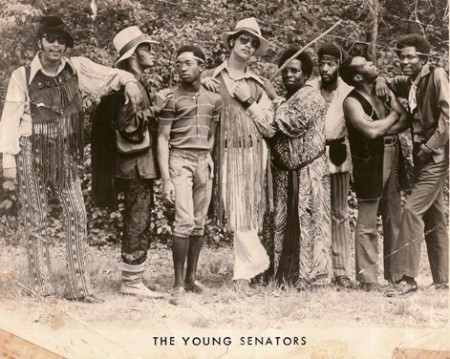 He was living in Washington DC and was the trumpet player for the group The Young Senators. The Young Senators were the top-rated R&B group in the area after the release of their hit, the Guilbeau penned “The Jungle” after which they were asked to tour as the backing group of Eddie Kendricks. Kendricks was so enamored of their sound that he recorded his seminal album “My People… Hold On” with the Young Senators as the band who played all the music, including what is widely considered the first ever Disco song, “Girl You Need A Change Of Mind.”
He was living in Washington DC and was the trumpet player for the group The Young Senators. The Young Senators were the top-rated R&B group in the area after the release of their hit, the Guilbeau penned “The Jungle” after which they were asked to tour as the backing group of Eddie Kendricks. Kendricks was so enamored of their sound that he recorded his seminal album “My People… Hold On” with the Young Senators as the band who played all the music, including what is widely considered the first ever Disco song, “Girl You Need A Change Of Mind.”
Gilbeau was still very active in the DC community which was a hotbed of talent that included Chuck Brown’s Soul Searchers, and another group that Gilbeau discovered, Black Heat. Black Heat was in the community and, had ties with The Young Senators. Gilbeau took Black Heat to Joel Dorn at Atlantic Records, whom he had known from his days as session player for Ray Charles and Hank Crawford. The funk outfit was signed and, with Dorn on production, Atlantic (which was always a very forward thinking imprint in general) was ushered into the future with a brand new sound. Black Heat recorded 3 albums before they disbanded, but not before leaving their mark.
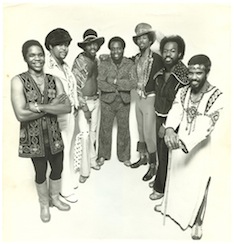
Espo pulled this record out and put it in my hands in what was probably 1990 or 1991 and told me “Do not tell anyone what this record is or share it with anyone.” I looked at it with the wild dudes on the cover with all the flames and the words “No Time To Burn” across the front and I swore I was looking at the baddest shit I had ever seen. When he placed the vinyl on the turntable and “You Should’ve Listened” came on with it’s heavy funk and overall ATTITUDE (that’s a common theme with me I think) I was beyond excited. But then when right past 2 minutes the song revs up and launches into one of the baddest breaks I had ever heard it was game over. Just furious drumming, with percussion where you can definitely see the DC sound, and the very beginnings of what would eventually become Go-Go music. Espo looked at me and was like “I told you, so so keep this under wraps.” That was probably the beginning of a long stretch of time where I blacked out my labels and was very secretive about my records. Well the pendulum swings again and here we are, with me sharing this with the world. Not that this is a Secret Squirrel break at this point or anything, but I think you know what I mean. Anyway, I hope you don’t mind Steve. I figure the Statute Of Limitations for Funk Breaks expires around the 20 year mark. But thanks, my dude. This one is a killer.
Black Heat “You Should’ve Listened” (Atlantic, 1974)
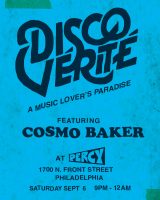 Saturday September 6th – Disco Vérité @ Percy – Philly
Saturday September 6th – Disco Vérité @ Percy – Philly 